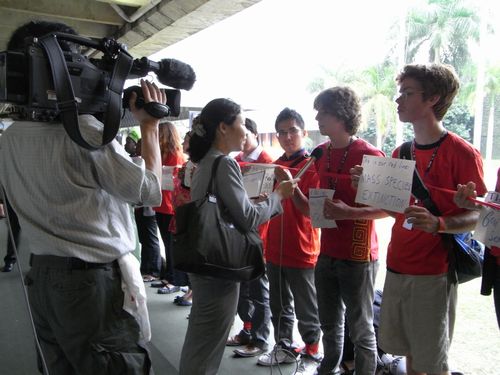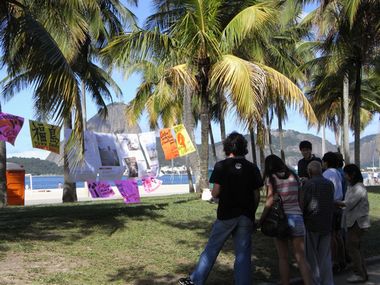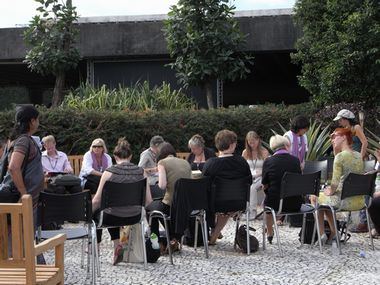August 14, 2012
After Rio+20 -- How to Deliver the Voices of Civil Society to Decision-makers?
Keywords: Newsletter
JFS Newsletter No.119 (July 2012)

The United Nations Conference on Sustainable Development, known as Rio+20, was held from June 20 to 22 in Rio de Janeiro, Brazil, and adopted the outcome document, "The Future We Want." The Rio+20 Summit hosted more than 45,000 participants from 191 countries and regions across the world, surpassing the Earth Summit of 20 years ago in terms of size.
Our May 2012 issue featured an article entitled "Japanese Private Sector Efforts Toward Rio+20." This month's article examines what was communicated - or not communicated - at Rio+20 from the viewpoints of citizens and NGOs, and explores future challenges concerning the involvement of civil society.
Were the Voices of Civil Society Delivered?
Japanese civil society has been paying a lot of attention to energy and nuclear power issues since the Fukushima Daiichi Nuclear accident in March 2011. Japan is still facing a difficult situation, and Rio+20 should have been a great opportunity to tell the world of its post- disaster experience and appeal for sustainable energy development, because the energy issue was one of the focal points of the summit. However, Foreign Minister Koichiro Gemba, who represented Japan at the plenary session, said nothing about the nuclear accident itself, although he expressed Japan's sincere appreciation for the great support and encouragement offered from all over the world after the Great East Japan Earthquake.
On the other hand, Japanese NGOs and citizen groups took every opportunity to talk about the nuclear power issue and the current state of Fukushima.
At the Rio+20 Summit, many side events were held by companies and NGOs in addition to the plenary sessions, preparatory meetings and negotiations. One was an event titled "Organic farming contributing to community revitalization, sustainable development and green economy: cases in Fukushima," which was jointly organized by several Japanese NGOs in an effort to deliver the voices of people in Fukushima to the Rio+20 summit.
Seiji Sugeno, one of the speakers at the event, has been engaged in organic farming in Fukushima Prefecture for more than 20 years. In 2009, he established the Fukushima Organic Agriculture Network to link organic farmers and communities in the prefecture. These activities were well under way when the nuclear accident occurred, causing tremendous damage to the surrounding area including coppice forests and agricultural areas with rich biodiversity. Sugeno and network members started working to restore the soil, believing that Fukushima's hope for recovery lies in soil restoration through organic farming. Their efforts have already started producing tangible results. Based on these experiences, Sugeno said to the audience, "We should change direction toward denuclearization now! If not now, when?"
Meanwhile, Japanese and Brazilian NGOs engaged in the antinuclear movement organized a forum on nuclear weapons and nuclear power at the "People's Summit," an event held at an ocean-side park away from the main venue of the summit. Brazil is one of the few South American countries that have nuclear power plants, and is also faced with environmental destruction caused by uranium mine development. So public concern about nuclear power plants is high, and about 50 or 60 people stopped at the forum and intently listened to Japanese speakers.

Masako Sakata of the Japan Civil Network for the United Nations Decade on Biodiversity, who was very active at the People's Summit, felt there were many good responses in the dialogue among citizens around the world, saying, "Things go faster when we connect directly with one another than when we lobby national governments or the United Nations. We would like to make the future we want in our own way." She also said that she found a new challenge: "Japanese people should deepen their communication with each other and struggle to find an effective way of conveying what they have to say about important issues."
How Far Did our Participation Go?
The Outcome of the Conference, the official outcome document adopted at the Rio+20 Summit, contains many expressions such as "reaffirming" the commitments made two decades ago. The media has already reported that the outcome was very short on innovation. Headlines in Japanese newspapers read, for example, "All major problems postponed" "Wave of criticism for poor outcome," and "Ended up with empty slogans on green economy."
The Rio+20 NGO Forum Japan, which we covered in our May issue, played an important role in appealing for the participation of the NGO and citizens' sectors in the process of negotiating the outcome. The Forum made the necessary preparations before the conference, and during the conference it had three skull sessions each with other NGOs, senior government officials and media to exchange information and convey NGO information.
Midori Kitahashi, a staff member of the Environmental Partnership Council who was very much concerned with the connections among sectors, was appreciative of the results, saying, "This was the first meeting in which all sectors submitted opinions on the zero-draft. Almost all NGOs were able to observe the preparative conferences and share documents for negotiation as needed. This meeting was said to be the most open ever for a UN negotiation process, and I definitely felt the effect of these efforts to encourage citizen participation." However, she had doubts about how far the views of NGOs were reflected in the negotiations, and pointed out that many NGOs in Japan and overseas complained about the phrase, "with the full participation of civil society" in the first article of the outcome document.
In addition, only NGOs registered as nine "major groups" were allowed to participate in the actual process, leaving citizen participation as an open question. Fumiko Noguchi of the Japan Council on the UN Decade of Education for Sustainable Development also experienced difficulties participating in the negotiation process. NGOs concerned with education are not counted as major groups, probably because "education" is cross-cutting. Therefore, she recalled, "I wondered when would have been the most effective for our input on the zero-draft because we had limited opportunities to share documents. It was also difficult to grasp the schedule from the pre-negotiation process to the summit itself."
Summit negotiations were ridiculed as having been "already over before they started," because the host country Brazil had already completed the draft by the start of the plenary session. As one senior government official said, "Few chances were left to modify the document after the plenary session started." The negotiations were apparently open to all citizens because they could express their opinions through the Internet even if they were not members of an NGO. However, it was entirely unclear whether this constituted a practically meaningful opportunity to participate in the summit.
Stronger Ties beyond National Frameworks
It is said that one of the few successes in the outcome document was an agreement to launch a process of formulating Sustainable Development Goals (SDGs). As a start, a working group consisting of delegates from 30 countries will be established by September 2012.
The Millennium Development Goals (MDGs) for poverty eradication and sustainable development were adopted in 2000 and the deadline for their achievement is 2015, and so there had been talk of establishing SDGs to go along with the post-MDG discussion. However, setting specific themes was put off and decisions on frameworks for both sets of goals were deferred.
While most NGOs from Japan that participated in Rio+20 were environmental organizations, NGOs focused on international cooperation and development have been leading the MDG discussion. Talks about post-MDGs has already started in the NGO-MOFA (MOFA: Ministry of Foreign Affairs) Regular Meetings, etc. To incorporate the SDG issue into the discussion, close ties need to be created between environmental and developmental organizations.
Masaaki Ohashi, Chairperson of the Japan NGO Center for International Cooperation (JANIC), who participated in Rio+20 as one of the few delegates from international cooperation and development NGOs, pointed out that the civil sector needs to take new action: "Discussions about SDGs and post MDGs should be combined to generate a synergistic effect such as when one and one make more than two," he said.
Koyu Furusawa, Chief Executive of Japan Center for a Sustainable Environment and Society (JACSES), attended the Rio Summit 20 years ago, the Johannesburg Summit 10 years ago, and Rio+20 as an NGO advisor to the Japanese government delegation. He gave Rio+20 a certain degree of credit for exploring civil participation in 21st century style, although he also showed his disappointment, saying "the result was a great setback."
He found some hope as well, saying, "The government and NGOs were completely separate 20 years ago. Dialogue between them finally started recently. It was great progress that this time, major NGOs could obtain the necessary documents beforehand that allowed them to participate in the pre-negotiation discussion. In the future, we will need a new cross-border framework to tighten cooperation among citizens and NGOs around the world if we are to lead discussions."
Rio+20 was a good chance also for JFS, whose mission is to change Japan and the world to achieve a sustainable society. We also found a new challenge - how to convey the voices of Japanese civil society and connect them with the world.

Written by Kazuko Kojima
Related
"JFS Newsletter"
- 'Good Companies in Japan' (Article No.4): 'Eightfold Satisfaction' Management for Everyone's Happiness
- "Nai-Mono-Wa-Nai": Ama Town's Concept of Sufficiency and Message to the World
- 'Yumekaze' Wind Turbine Project Connects Metro Consumers and Regional Producers: Seikatsu Club Consumers' Co-operative
- Shaping Japan's Energy toward 2050 Participating in the Round Table for Studying Energy Situations
- 'Good Companies in Japan' (Article No.3): Seeking Ways to Develop Societal Contribution along with Core Businesses


